Test tunnels: aerodynamic and numerical
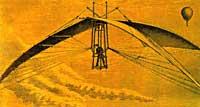
About twenty-five years ago the first flight of a prototype occurred with the adventure, but today the airlines buy them before making the planes. The advancement of computers allows engineers to calculate and better predict the behavior of planes during the flight. For this purpose, the complex phenomena of air movement that occur in the environment of the plane are analyzed by methods elaborated by specialists in fluid mechanics. Although these types of studies are still not fully reliable, their use is booming. Will calculations ever replace the trial?
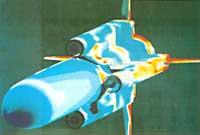
Two ways are foreseen: on the one hand the construction of large tunnels and performances, of course expensive, and on the other the use of supercomputers that would be numerical tunnels.
An example of the first route is the Cologne test tunnel. The objective of this tunnel is to analyze the transonic regime, that is, if the speed of the plane is similar to that of the sound (note that the speed of the transport plane is convenient that it is one thousand kilometers per hour). Technically, this speed corresponds to the number 0.9 of Mach, which is the ratio between the speed of the plane and the speed of sound.
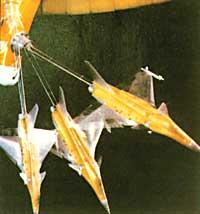
The physical phenomena that occur at transonic speeds are complex, so it is convenient to express them as best as possible. To express the aerodynamic flow, two parameters must be taken into account: Number of Mach and number of Reynolds. These parameters should be simulated as best as possible in the tunnel. The Mer number simulates well by injecting air at the required speed.
However, the number of Reynolds does not simulate so easily (the number of Reynolds can be defined as the ratio between inertia forces and viscosity forces). The number of Reynolds depends on the size of the model. Being the model smaller than the real plane, engineers have to extrapolate it and these extrapolations are sometimes not correct. We must search for solutions to simulate this number. One of them is the reduction of temperature. In the Colonia tunnel the air will be replaced by nitrogen as fluid.
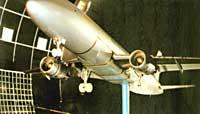
As nitrogen can cool up to -180°C, it can be appropriate to simulate the number of Reynolds. But in 1994, specifically in the year of the launch of the tunnel, it can become obsolete, since in the coming years the evolution of supercomputers can be spectacular.
According to some researchers, the calculation can replace simulations impossible to perform in tunnels and reduce the time limits and costs of the necessary simulations in the design of spaces. On the other hand, the new aircraft models have a test period. The greater the required performance, the greater the test period. Therefore, according to an extrapolation, the test period of an aerospace vehicle that should make a first flight in 2000 would be about fifty years in tunnels.
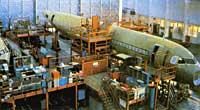
In view of this figure, it is not surprising to be able to analyze other pathways. Supporters of the calculations simulations have argued in favor of this pathway for the increased power experienced by computers. The increase in the calculation speed of large computers and the capacity of the main memory has been exponential and it is foreseeable that the same trend is maintained in the future. In addition, the growth of power has been accompanied by a decrease in prices. The price increase of computers has been lower than that of its power. Therefore, the cost of the calculation is decreasing over time.
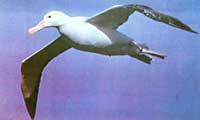
The calculation simulation consists of two important parts, hardware and software. As we've talked about hardware so far, then we'll talk about software. Theoretically, the movement of air around any body can be known by solving the equations of fluid mechanics. However, through this system and taking into account the difficulty of the equations, there is no computer that can reach a result. Therefore, these complex equations are replaced by databases. The databases are based on the accumulated experience, but this path has not been able to be used until recently, on the one hand because there was not enough experience and on the other because computers were not as fast as now.
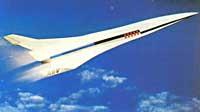
However, in any simulation the treatment of turbulence is extremely complicated. The conditions obtained in both aerodynamic and calculus tunnels make it difficult to explain the state of turbulence. Therefore, in some places it has been chosen for the development of mixed routes, that is, for the application of numerical methods in aerodynamic tunnels. NASA, for example, is in favor of it.
A manager said: The tunnels testing needs of current and future North American aerospace projects are growing. The new projects, together with the most advanced calculations, require the most accurate tests possible. Therefore, we must maintain our testing capacity and strengthen it.
Of course, access to the mixed routes has high economic costs. Countries like France have opted for aerodynamic tunnels. The technologies used in these tunnels will be new. The mechanical devices formerly used to measure speed modified the flow. On the contrary, a laser-based optical method can provide speed components in two or three directions without affecting the airflow.


Another method based on laser allows to visualize the trailers that occur after the fins or the subsequent flow of the propulsion systems. The appearance of the walls of the tunnels is also important. When the number of Mach is the order of 1, the shock waves emitted by the model are reflected in the walls and become. Therefore, for this not to happen, the wall must have a special aspect.
By supporting the model on a support, this can affect the movement of the fluid. To remove this effect you must remove the support and search for other supports. This type of supports are obtained by magnetic fields.
However, if these renovated tunnels are controlled by supercomputers, aerodynamic tunnels will become numerical tunnels. Therefore, the best options are offered by combining practical trials and computers.





